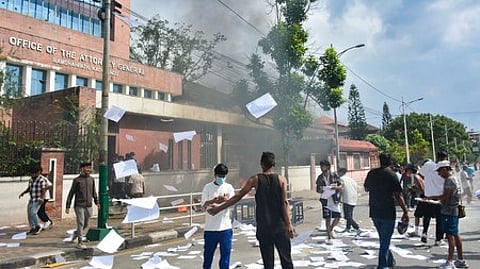
- Union Budget 2026
- Home
- NewsGram USA
- India
- न्यूजग्राम
- World
- Politics
- Entertainment
- Culture
- Lifestyle
- Economy
- Sports
- Sp. Coverage
- Misc.
- NewsGram Exclusive
- Jobs / Internships

New Delhi, Sep 13: Since Monday, when protesting ‘Gen Z’ took to the streets, and violence broke out in Nepal -- leading to the resignation of Prime Minister K.P. Sharma Oli -- New Delhi has been watching wearily.
“We witnessed unrest in Sri Lanka, Bangladesh, and Nepal -- all three in our neighbourhood -- leading to a regime change,” pointed out Kulbir Krishan, former member of India’s National Security Advisory Board.
“In the case of Sri Lanka and Nepal, it appears to be spontaneous. In Sri Lanka, the anger was against Gotabaya Rajapaksa (the country’s eighth President, who stepped down on July 22 during the protests) and his family. While the other two were results of accumulated anger against corruption, nepotism, and misrule,” he said.
“But the Bangladesh incident seems somewhat different as it was an elected government, but the last election was always being called into question for credibility. Also, there was definitely a foreign hand involved in the incident there,” stressed Krishan.
“While in Sri Lanka it (external interference) doesn't seem to be there, and in Nepal, it’s too early to say whether there is a foreign hand or not,” he added.
Stressing on maintaining caution and vigilance, Samir Kumar Mitra, former DIG, BSF, observed, “I’ll say it’s a critical moment, and we hope the situation doesn’t aggravate.”
At the same time, “we should be prepared for any kind of eventualities and situation, but without escalating the situation,” he added.
India shares over 1,750 km of an open border with Nepal. Though security has been shored up, uncertainty persists.
Now the Himalayan country has appointed an interim Prime Minister as it tries to come out of an uncertain period, pick up the pieces, and hold elections in the near future.
“India’s security demands utmost vigilance, and we must take proactive measures to safeguard our national interests. I am confident that those in positions of authority are addressing the matter with due diligence, while ensuring that our actions do not interfere in the internal affairs of Bangladesh or Nepal,” said the former member of the National Security Advisory Board (NSAB).
“As far as India’s security is concerned, we have to be extremely careful and take steps to safeguard our interests. I’m sure that those in positions of authority are looking into it and trying to do it without interfering in the internal affairs of either Bangladesh or Nepal,” said the former member of NSAB.
A stable Nepal is crucial for India’s Himalayan border security and regional influence. Beijing can be expected to influence Kathmandu, where proactive diplomacy from New Delhi can act as a counterbalance.
The unfolding events in Nepal this week bear resemblance to the uprising in Bangladesh last year. It saw the fall of the Sheikh Hasina government and the installation of an interim government in Dhaka.
The unrest and transition in India’s eastern and northern borders followed a similar uprising in the south, where the Sri Lankan government had to step down when faced with a similar wave of public anger in 2022.
To the west, Pakistan has always been unstable within and hostile outside. Add to that, Myanmar’s ongoing crises and the Maldives’ pro-China tilt do not augur well for India. A stable neighbourhood is always desirable.
Group Captain R.K. Das (Retired) stressed the need to be wary of unscrupulous elements intending to spread uncertainty and chaos.
“At times of turmoil in a neighbouring country, we need to further strengthen security at our borders. In such situations, infiltration and smuggling of arms may rise in the border areas,” he said.
India has consistently followed a “Neighbourhood First” policy, offering support while respecting sovereignty.
In cases of uncertainty in the neighbourhood, New Delhi has monitored the developments to safeguard its strategic interests and engaged diplomatically at the right time.
The present crisis could lead to recalibration of ties, where shifting strategic alignments may create long-term security and political risks for the sub-continent, say experts.
(IANS/NS)
Also Read:
